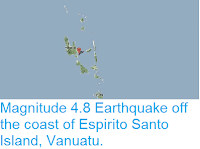The Vanuatu Geohazards Observatory has reported an eruption from a new fissure on Mount Ambrym, a basaltic island volcano in the New Hebrides Island Arc. The activity began with a series of small earthquakes, leading up to the onset of eruptive activity at about 6.00 am local time on Saturday 15 December 2018, from a fissure to the southeast of the Lewolembwi
Crater, which produced lava fountains about 40 m high and a lava flow which ran to the east and filled much of the Lewlembwi Crater. Activity on the volcano persisted for another two days, with the lava fountains slowly being replaced with ash emissions.
Lava fountaining from a new fissure on Mount Ambrym, Vanuatu, on 15 December 2018. John Tasso/Vanuatu Island Experience.
Mount Ambrym comprises a complex of basaltic structures overlying an older shield volcano, which was initially formed in a massive eruption in about 50 AD, since when it has continued to grow. It has a 12 km widr caldera, which contains two smaller cones (Marum and Benbow) as well as seven smaller craters, Lewolembwi, Marumliglar, Mbwelesu, Minnei, Niri Mbwelesu, Niri Mbwelesu Taten, and Niri Mbwelesu Taten, and four cinder cones, Dalahum, Tuvio, Vetlam, and Woosantapaliplip.
Vanuatu is located on the southwestern fringe of the Pacific Plate,
close to its boundary with the Australian Plate, which is being
subducted along the New Hebrides Trench, to the west of the islands. The
subducting Australian Plate passes under the islands of Vanuatu as it
sinks into the Earth, causing Earthquakes as the plates stick together
then break apart as the pressure builds up. As the plate sinks further
it is partially melted by the heat of the Earth's interior. Some of the
melted material then rises through the overlying Pacific Plate, fuelling
the volcanoes of Vanuatu.
See also...
Follow Sciency Thoughts on Facebook.







